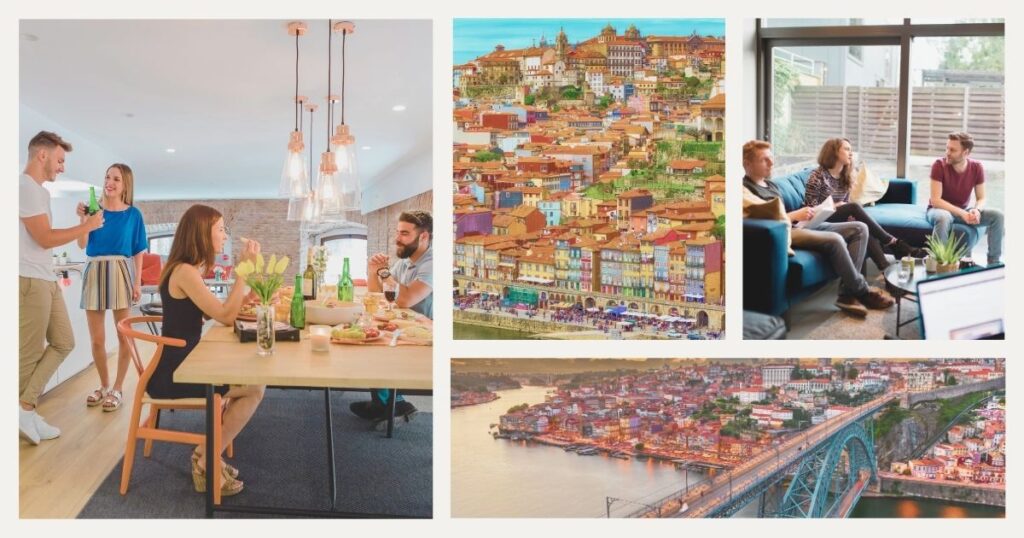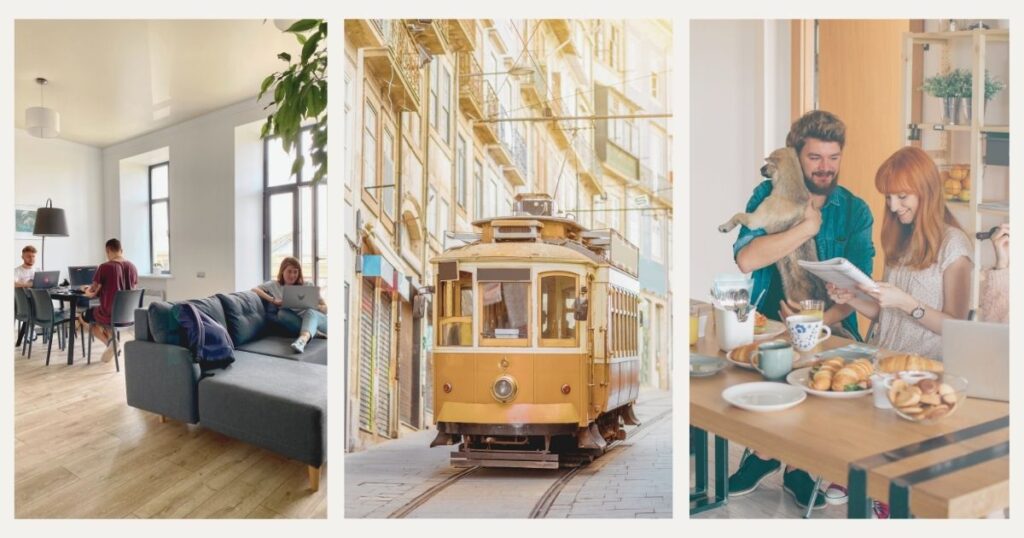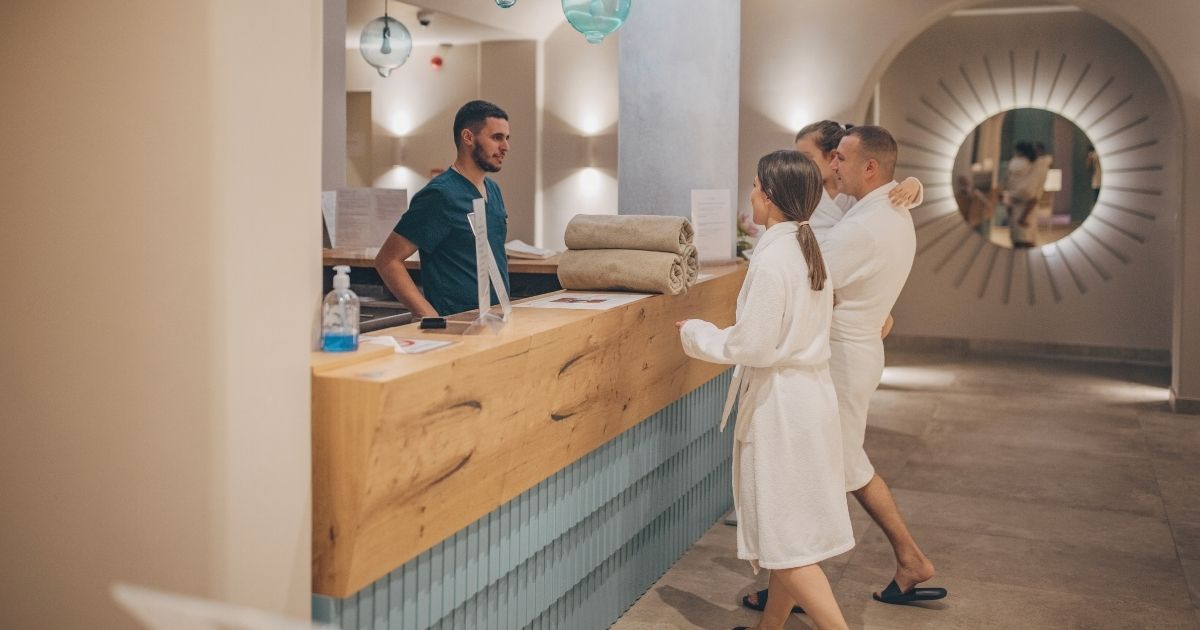Imagine waking up in a beautifully designed space overlooking Lisbon’s historic hills, grabbing coffee with fellow remote workers from around the world, and starting your workday in a dedicated co-working area—all within the same building. Co-living in Portugal has revolutionized how digital nomads experience this stunning Atlantic nation, combining the affordability and charm of Portuguese living with the convenience of ready-made communities.
Portugal has emerged as Europe’s premier destination for location-independent professionals, and co-living spaces have played a crucial role in this transformation. Co-living in Portugal offers an all-in-one solution that addresses traditional nomad challenges while immersing residents in Portuguese culture.
This comprehensive guide explores everything you need to know about co-living in Portugal, from the best locations and pricing to community dynamics and practical considerations.
What is co-living in Portugal?

Co-living in Portugal represents a modern housing concept that combines private living quarters with shared common spaces, creating environments specifically designed for remote workers and digital nomads. Unlike traditional apartment rentals, these spaces prioritize community building, networking opportunities, and work-life integration.
The co-living model typically includes fully furnished private bedrooms or studios within larger buildings featuring shared kitchens, lounges, co-working areas, and often rooftop terraces or gardens. Residents pay an all-inclusive monthly fee covering accommodation, utilities, internet, cleaning services, and community events. This comprehensive approach eliminates the hassle of setting up multiple services and accounts when moving to a new country.
What sets co-living in Portugal apart is the emphasis on cultural integration and authentic Portuguese experiences. Many spaces organize Portuguese language exchanges, local food tours, wine tastings, and cultural immersion activities that help residents connect with Portuguese traditions while building international networks. Some operators partner with local businesses, restaurants, and cultural institutions to provide exclusive experiences for residents.
The concept has evolved to serve various demographics, from short-term digital nomads seeking month-long experiences to remote workers establishing longer-term Portuguese bases. This flexibility makes co-living in Portugal accessible to professionals with different lifestyle preferences, budget constraints, and commitment levels.
💡 Did you know? Many co-living spaces in Portugal operate as legal businesses with proper licensing, ensuring residents have legitimate accommodation arrangements that support visa applications and official documentation needs.
Benefits of co-living in Portugal for digital nomads
Co-living in Portugal offers numerous advantages that traditional accommodation options cannot match, particularly for location-independent professionals navigating new cities and cultures.
The most significant benefit is immediate access to like-minded communities. Rather than spending weeks building social connections, residents join established networks of remote workers, entrepreneurs, and creatives from diverse international backgrounds. These communities often become powerful professional networks, leading to collaboration opportunities, business partnerships, and career advancement. Many residents report finding clients, co-founders, or valuable mentors through their co-living experiences, making the accommodation investment a professional development opportunity.
Co-living in Portugal eliminates the administrative burden of setting up life in a new country. Residents avoid the complexities of utility setup, internet installation, furniture procurement, and cleaning arrangements. This convenience allows nomads to focus on their work and exploration rather than logistics. The all-inclusive model also provides financial predictability, with one monthly payment covering all living expenses except food and personal items, helping nomads avoid unexpected costs that can complicate international living.
Quality co-living spaces actively facilitate cultural integration through organized activities, local partnerships, and Portuguese language support. This integration helps residents develop deeper connections with Portuguese culture beyond typical tourist experiences. Many spaces employ Portuguese staff or maintain partnerships with local organizations, creating opportunities for authentic cultural exchange and practical language practice that enhance both personal growth and professional opportunities within Portugal’s growing international business community.
🌟 Pro tip: when staying in co-living spaces in Portugal, maintaining reliable communication with international clients becomes crucial. Consider using Holafly’s eSIM for Portugal to ensure seamless connectivity across the country, especially when exploring remote areas or transitioning between different co-living locations.
Best locations for co-living in Portugal

Portugal offers diverse regions with distinct characteristics that appeal to different types of remote workers. Understanding these regional differences helps nomads choose co-living locations that align with their lifestyle preferences and professional needs.
Lisbon hosts the largest concentration of co-living options, ranging from converted historical buildings in neighborhoods like Príncipe Real to modern developments in emerging areas like Marvila. The capital offers unparalleled networking opportunities, with regular tech events, startup competitions, and international business conferences. Portugal’s capital provides access to the country’s most developed infrastructure, including excellent public transportation, international airport connectivity, and comprehensive healthcare facilities. The city’s diverse neighborhoods offer different atmospheres, from the bohemian creativity of Bairro Alto to the sophisticated business district of Avenidas Novas.
Porto’s co-living scene reflects the city’s artistic spirit and more relaxed pace compared to Lisbon. Spaces often occupy beautifully restored buildings in neighborhoods like Cedofeita or Rua Miguel Bombarda, known for their galleries, independent shops, and creative communities. The northern city offers significantly lower living costs while maintaining excellent amenities and connectivity. Porto’s compact size makes it easy to explore on foot or by bicycle, fostering a sense of community that extends beyond individual co-living spaces into the broader neighborhood fabric.
Coastal and regional options have expanded beyond major cities to include destinations like Ericeira, known for its surf culture and relaxed atmosphere, and inland locations like Óbidos, offering medieval charm and tranquil working environments. These options appeal to nomads seeking different lifestyles, from beachside productivity to countryside inspiration. While offering fewer networking opportunities than major cities, they provide unique cultural experiences and often stronger connections with local Portuguese communities.
Cost analysis of co-living in Portugal
Understanding the financial aspects of co-living in Portugal helps nomads make informed decisions about this lifestyle option compared to traditional accommodation alternatives.
Co-living in Portugal typically ranges from €600-1,200 monthly for private rooms in shared spaces, with pricing varying significantly based on location, amenities, and accommodation quality. Lisbon commands premium prices, while Porto and regional locations offer better value propositions. Premium spaces with additional amenities like rooftop terraces, fitness facilities, and organized activities may cost more but provide significant lifestyle enhancements.
These fees generally include accommodation, utilities, high-speed internet, cleaning services, and access to common areas and amenities. When compared to the combined costs of traditional rental deposits (often 2-3 months’ rent), utility setup fees, furniture procurement, and internet installation, co-living often provides comparable or better value, especially for stays under six months. The financial predictability also helps nomads budget more effectively.
While co-living fees cover most expenses, residents should budget for food, transportation, and personal activities. Food costs are reasonable, with grocery expenses typically ranging from €150-250 monthly for home cooking, while restaurant meals remain affordable compared to other Western European countries. Transportation costs vary by location, with Lisbon and Porto offering efficient public transportation systems at €30-40 monthly, while regional locations might require occasional car rentals for exploration.
💡 Did you know? Many co-living spaces in Portugal offer discounts for longer stays, with three-month commitments often reducing monthly rates by 10-15%, making extended stays more economical for nomads planning longer Portuguese experiences.
Choosing the right co-living space in Portugal

Selecting the ideal co-living experience requires careful evaluation of multiple factors that impact both lifestyle satisfaction and professional productivity.
Quality co-living in Portugal should provide well-designed private spaces with comfortable workstations, adequate storage, and sound insulation for video calls. Common areas should include professional co-working zones with reliable internet, meeting rooms for client calls, and comfortable social spaces for community interaction.
The community composition significantly impacts the co-living experience. Spaces that attract diverse, professional residents tend to offer better networking opportunities and more enriching social experiences. Consider the balance between international residents and Portuguese locals, as well as the mix of short-term nomads versus longer-term residents.
Location within Portuguese cities affects daily convenience, professional opportunities, and cultural experiences. Spaces in central neighborhoods provide walking access to restaurants, cultural sites, and networking events, while peripheral locations might offer more space and tranquility at lower costs.
🌟 Pro tip: successful co-living residents in Portugal often maintain flexible attitudes toward community dynamics while establishing clear personal boundaries for work and privacy needs.
Digital nomad considerations for co-living in Portugal
Co-living in Portugal presents unique opportunities and challenges for remote workers that differ from traditional accommodation arrangements.
Managing professional responsibilities within community-focused environments requires intentional boundary setting. Successful co-living residents establish clear work schedules, utilize private spaces for important calls, and communicate professional needs to housemates. The social nature of co-living can sometimes conflict with intensive work periods, making it important to choose spaces that respect professional requirements.
Co-living arrangements in Portugal must comply with local housing regulations and rental laws. Reputable operators maintain proper licensing and can provide documentation necessary for visa applications, tax purposes, and official registration requirements.
Co-living in Portugal offers unique opportunities for cultural immersion that traditional accommodation cannot match. Many spaces organize Portuguese language exchanges, cultural events, and local community activities that accelerate integration into Portuguese society.
Final thoughts
Co-living in Portugal represents more than just accommodation—it’s a lifestyle choice that can transform your nomadic experience through community building, cultural integration, and professional networking. The combination of Portugal’s welcoming culture, affordable living costs, and innovative co-living operators creates an environment where remote workers can thrive both personally and professionally.
Whether you’re drawn to Lisbon’s entrepreneurial energy, Porto’s creative atmosphere, or Portugal’s stunning coastal regions, co-living options provide accessible entry points into Portuguese life while maintaining the flexibility that defines the nomadic lifestyle. As this accommodation model continues evolving, Portugal remains at the forefront of creating spaces that serve the unique needs of location-independent professionals.
Co-living in Portugal offers an innovative solution for digital nomads seeking community, convenience, and cultural immersion. The combination of affordable living costs, welcoming communities, and professional amenities creates an environment where remote workers can focus on their careers while enjoying authentic Portuguese experiences. For comprehensive guidance on living and working in Portugal as a digital nomad, explore Nomada’s accommodation guides to discover various housing options that complement the co-living experience.
Ready to experience the best of Portuguese co-living? Nomada provides expert guidance and practical solutions to help digital nomads navigate every aspect of location-independent living.
Let us help you find your perfect Portuguese community! 🌍
Frequently asked questions about co-living in Portugal
Most co-living spaces in Portugal offer flexible stay options ranging from one month to over a year. Many operators provide discounts for longer commitments, typically offering reduced rates for stays exceeding three months. Always verify minimum stay requirements and cancellation policies before booking.
Reputable co-living operators in Portugal can provide accommodation contracts and official documentation needed for visa applications and legal residence requirements. However, they typically cannot provide visa sponsorship or legal immigration advice, so consult immigration professionals for complex visa situations.
Quality co-living spaces in Portugal typically provide fiber optic internet with speeds ranging from 100-500 Mbps, sufficient for video conferencing, file uploads, and bandwidth-intensive work. Always verify internet specifications before booking, especially if your work requires specific connectivity standards.
Yes, many co-living spaces in Portugal accommodate different personality types by providing private work areas, quiet zones, and optional community participation. Look for spaces that emphasize respect for different lifestyle preferences and offer adequate private space for focused work and personal time.
Most established co-living operators in Portugal provide mail handling services and can receive packages on behalf of residents. Some spaces offer official address registration for administrative purposes, though requirements vary by operator and local regulations. Confirm mail handling procedures during the booking process.




